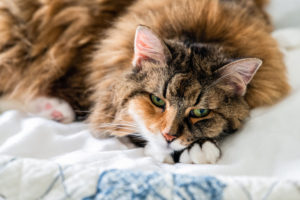Why is My Cat Vomiting?
Cats can vomit for a wide range of reasons. Where it can sometimes be normal for cats to vomit, it’s always a cause for concern. Vomiting at times can mean it’s time to rush to the emergency room, or it can mean your furry friend might have just had a busy self-grooming session! Either way, always plan on speaking with your veterinarian to see what related symptoms your cat has, and they can help walk you through the next steps to take based on that information. If you want to learn more on why your cat is vomiting, keep reading.

Causes
There are many reasons your cat may begin to vomit.
The main causes are listed below:
Hairballs
One of the most common, but somewhat normal vomiting behavior a cat may show is vomiting due to hairballs! This occurs when cats ingest a large amount of hair during a grooming session. At times, it is difficult for a cat’s body to fully ingest this hair in their stomach, so it comes back out of the body alongside bile. Unless your cat seems to be in pain or is regurgitating an abnormal amount of hairballs in a day, this is typically normal for cats to do sometimes. But, you should always check in with your veterinarian to look for other symptoms alongside a hairball episode.
Gastroenteritis
Gastroenteritis is categorized as inflammation to the gastrointestinal tract, which includes the intensities and the stomach. This can be caused by anything ranging from viruses to trying a new food that didn’t sit well with them. This condition can at times be serious since it causes chronic dehydration, so consult with your veterinarian if this is suspected.
Food Allergies
Pets can absolutely have allergies that can cause symptoms like nausea. Where it tends to be uncommon for a cat to have food allergies, some intolerance to food can cause internal inflammation. Apart from nausea, food intolerances can also cause mild to severe diarrhea.
Chronic Illnesses
There are many different illnesses that can cause a cat to begin this behavior. Sometimes, cats even get a flu or a stomach bug just like us! On the other hand, some other illnesses where vomiting may be a consistent symptom can include: pancreatitis, liver failure, nervous system failures, and cancer.
Foreign Obstructions
Just like dogs, cats will sometimes be sneaky and get into things they aren’t supposed to. More commonly, if you have a playful cat, little pieces of toys or string can become a nightmare for a cat if ingested. If foreign bodies are ingested and cannot fully pass through the digestive system, this can be a crucial matter that needs to be addressed at an emergency vet right away.
Poisoning
Things like medicine or certain foods can become poison to a cat. This is serious as there are many things humans have in their household that can become deadly if an animal ingests. If you suspect your cat may have gotten into something they shouldn’t have, call the vet right away for the next steps.
Intestinal Parasites
Especially for kittens and outdoor cats, parasites can be surprisingly common. A simple fecal exam or even just visually seeing the parasites in the vomit or stool will diagnose this, and they can be relatively easy to treat. In order to diagnose what the direct cause of the vomiting is, you can evaluate your cat to see if any other serious symptoms are along the vomiting that may require a vet’s attention.
Difference Between Acute and Chronic Vomiting
Understanding the difference between acute or chronic vomiting is a key component when figuring out if the regurgitation is on the serious side. Acute vomiting means that it has only been present for a few days. Chronic vomiting is when the vomiting has been happening over a longer period of time. Knowing the category will be important for diagnosing your feline friend, and for mapping out the best treatment moving forward.
Treatment
Depending on the cause, the treatment could be easy.
Listed below are the best treatment methods:
Switching Food
For excessive hairballs, there’s great products out there that could help. Try switching their food to a formula that includes hairball control. These formulas contain special enzymes that help breakdown hairballs to make them easier to digest and easier on their stomach.
Medication
If your fur baby just caught a little stomach bug, your veterinarian may prescribe an anti-nausea meditation or recommend a bland diet for a few days while your cat recovers.
Hydration
Hydration is incredibly important for cats as throwing up can cause dehydration, so supplemental hydration with IV fluids may be necessary.
Contact a Veterinarian if Your Cat is Vomiting
In order to properly diagnose which of these reasons could be the culprit for vomiting in cats, a trip to vet would be necessary in order to get bloodwork done, as well as other tests like x-rays and ultrasounds. For more information on this topic, contact Veterinary Medical Center of St. Lucie by calling (772) 337-8570. Our animal hospital is open 24 hours a day and is dedicated to providing the best care for your pet. If your pet needs us, we are here for you!
